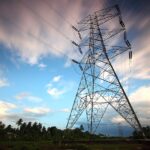Lowering Your Energy Utilities: A Comprehensive Guide to Conserving Gas & Electricity at Home!
In today’s fast-paced world, where technology and convenience have become an integral part of our daily lives, it’s easy to overlook the impact of our energy consumption on both our wallets and the environment. However, with rising energy costs and growing concerns about climate change, there has never been a better time to focus on conserving gas and electricity at home. This comprehensive guide will walk you through practical tips, strategies, and technologies to help you lower your energy utilities and reduce your carbon footprint, all while maintaining comfort and convenience in your home.
Understanding Your Energy Consumption
Before diving into specific ways to conserve energy, it’s crucial to understand where and how you use gas and electricity in your home. By gaining insights into your energy consumption patterns, you can make informed decisions about which areas to target for improvement. You can also seek the help from energy service companies.
Conduct an Energy Audit
Start by conducting an energy audit of your home. An energy audit involves evaluating your gas and electricity usage by reviewing your utility bills, inspecting your appliances, and assessing your home’s insulation and sealing. Many utility companies offer free or low-cost energy audits, or you can perform a DIY audit using online resources and tools.
Monitor Real-Time Consumption
Consider installing a home energy monitoring system. These devices provide real-time data on your energy usage, helping you identify when and where you’re consuming the most energy. Some systems even offer smartphone apps that allow you to track your energy consumption remotely.
Identify Energy-Intensive Appliances
Identify the appliances and devices that consume the most energy in your home. Common culprits include air conditioners, water heaters, refrigerators, and electric heating systems. Knowing which appliances are energy hogs will help you prioritize your efforts to conserve energy.
Practical Tips for Conserving Gas & Electricity
Now that you have a better understanding of your energy consumption, let’s explore practical tips and strategies to lower your gas and electricity usage effectively.
Upgrade to Energy-Efficient Appliances
Consider replacing old, energy-guzzling appliances with newer, energy-efficient models. Look for appliances with ENERGY STAR labels, which indicate they meet strict energy efficiency guidelines. While the initial investment may be higher, energy-efficient appliances will save you money in the long run through reduced energy bills.
Optimize Your HVAC System
Heating and cooling your home typically account for a significant portion of your energy consumption. To optimize your HVAC (Heating, Ventilation, and Air Conditioning) system:
- Regular Maintenance: Schedule annual maintenance for your HVAC system to ensure it operates efficiently.
- Programmable Thermostat: Install a programmable thermostat to adjust the temperature based on your schedule, saving energy when you’re not at home.
- Seal Leaks: Inspect and seal any gaps or leaks in your home’s insulation and ductwork to prevent heat or cold air from escaping.
Use Energy-Efficient Lighting
Swap out traditional incandescent bulbs for energy-efficient LED or CFL (Compact Fluorescent Lamp) bulbs. LED bulbs use up to 80% less energy and last significantly longer, making them a cost-effective choice for lighting your home.
Unplug and Use Smart Power Strips
Even when turned off, many appliances and electronic devices continue to draw power, known as “phantom energy” or “standby power.” Unplug devices when not in use or use smart power strips that automatically cut power to devices when they are turned off or not in use.
Wash Clothes and Dishes Wisely
When doing laundry, use cold water for washing and only run full loads. Similarly, with dishwashing, wait until you have a full load before running the dishwasher. Air-dry dishes and clothes when possible to save even more energy.
Reduce Water Heating Costs
Water heating is another major energy expense. To reduce water heating costs:
- Lower the water heater temperature to 120°F (49°C).
- Insulate hot water pipes to prevent heat loss.
- Consider installing a tankless water heater for on-demand hot water, which eliminates the need to constantly heat a large tank of water.
Seal Drafts and Insulate
Proper insulation and sealing are key to maintaining a comfortable temperature in your home while reducing energy consumption. Insulate your attic, walls, and floors to minimize heat transfer, and seal any gaps or cracks around doors and windows to prevent drafts.
Harnessing Technology for Energy Conservation
Advancements in technology have given rise to innovative solutions that can help you conserve energy at home. Here are some cutting-edge options to consider:
Smart Thermostats
Upgrade to a smart thermostat that learns your heating and cooling preferences and adjusts accordingly. These devices can be controlled remotely via smartphone apps and can even integrate with other smart home systems, allowing for seamless energy management.
Home Energy Management Systems
Invest in a home energy management system that provides real-time data and insights into your energy usage. These systems often include smart meters, which allow you to monitor and control energy consumption on a granular level.
Solar Panels
Consider installing solar panels on your roof to generate clean, renewable energy. Solar power can significantly reduce your reliance on grid electricity and even provide excess energy that you can sell back to the grid.
Energy-Efficient Windows
Replace old, drafty windows with energy-efficient ones. Energy-efficient windows are designed to minimize heat transfer, reducing the need for heating and cooling.
Home Automation
Embrace home automation to control and optimize various aspects of your home’s energy usage. Smart plugs, sensors, and automated routines can help you manage lighting, appliances, and climate control more efficiently.
Behavioral Changes for Energy Conservation
In addition to technology and appliance upgrades, your daily habits and behaviors play a crucial role in conserving energy. Here are some simple yet effective changes you can make:
Practice Energy-Efficient Cooking
When cooking, use lids on pots and pans to trap heat, cook with the appropriate-sized burner, and use the microwave or toaster oven for small meals when possible. These practices can reduce cooking energy consumption.
Be Mindful of Water Usage
Use water-saving fixtures, such as low-flow showerheads and faucet aerators, to reduce hot water usage. Also, fix any water leaks promptly, as dripping faucets and running toilets waste both water and the energy needed to heat it.
Limit Screen Time
Reducing screen time on electronic devices not only conserves electricity but also encourages healthier lifestyles. Encourage your family to engage in activities that don’t rely on electronic devices.
Set Energy-Saving Goals
Challenge yourself and your household to set energy-saving goals. For instance, you could aim to reduce energy consumption by a certain percentage each month or year and reward yourselves for achieving these goals.
Educate and Involve Your Family
Make energy conservation a family effort. Educate your family members about the importance of saving energy and involve them in implementing energy-saving practices. This can be a fun and educational way to work together as a family.
Financial Incentives and Rebates
Many governments and utility companies offer financial incentives and rebates for energy-efficient upgrades and renewable energy installations. These incentives can significantly offset the initial costs of energy-saving measures. Check with your local utility provider and government authorities authorities to see if you qualify for any of the following incentives:
Energy Efficiency Rebates
Utility companies often provide rebates for the purchase of energy-efficient appliances, such as refrigerators, washing machines, and HVAC systems. These rebates can significantly reduce the upfront costs of upgrading to energy-efficient appliances.
Tax Credits
In many countries, governments offer tax credits for homeowners who invest in renewable energy systems, such as solar panels, wind turbines, and geothermal heat pumps. These credits can amount to substantial savings on your annual tax bill.
Energy-Efficient Financing
Some financial institutions offer special financing options for energy-efficient home improvements. These loans often have lower interest rates and longer repayment terms, making it easier to fund energy-saving projects.
Energy Audits
As mentioned earlier, many utility companies offer free or low-cost energy audits. Take advantage of these audits to identify energy-saving opportunities in your home and receive expert recommendations on how to reduce your energy consumption.
Net Metering
If you install solar panels or other renewable energy systems, inquire about net metering programs in your area. Net metering allows you to sell excess electricity generated by your renewable energy system back to the grid, potentially earning you credits on your electricity bill.
Energy-Efficient Mortgages
Energy-efficient mortgages (EEMs) provide homeowners with additional funds to finance energy-efficient improvements as part of their mortgage. This can be an excellent option if you’re purchasing a new home or refinancing an existing one.
Educating Yourself and Others
Conserving gas and electricity at home is not only about implementing practical tips and using technology but also about staying informed and raising awareness about energy conservation. Here’s how you can become more educated and share your knowledge with others:
Stay Updated
Stay informed about energy-efficient technologies and practices by reading books, articles, and attending workshops or webinars on the subject. Knowledge is key to making informed decisions about energy conservation.
Share Information
Share your energy-saving experiences and knowledge with friends, family, and neighbors. Encourage them to adopt energy-efficient practices as well. Sometimes, a friendly conversation can lead to positive changes in someone else’s behavior.
Join Energy-Efficiency Programs
Many communities have energy-efficiency programs and initiatives aimed at promoting energy conservation. Joining these programs can help you connect with like-minded individuals and access valuable resources and information.
Support Renewable Energy
Advocate for renewable energy initiatives in your community and beyond. Supporting policies and projects that promote clean and sustainable energy sources can have a significant impact on reducing greenhouse gas emissions. Please feel free to list your energy company for free in our national business directory.
Tracking Your Progress
Conserving gas and electricity is an ongoing process. To stay motivated and track your progress, consider implementing the following strategies:
Keep a Conservation Journal
Maintain a journal or spreadsheet to record your energy-saving efforts and their impact on your utility bills. Tracking your progress can be rewarding and help you identify areas where you can further improve.
Use Energy Monitoring Apps
There are numerous smartphone apps available that can help you monitor your energy consumption and track your savings. These apps often provide insights into how your usage patterns change over time.
Compare Energy Bills
Regularly compare your current utility bills to previous ones. This can help you gauge the effectiveness of your energy-saving measures and identify any unusual increases in energy consumption.
 Conclusion
Conclusion
Lowering your energy utilities by conserving gas and electricity is not just about saving money; it’s also about reducing your environmental footprint and contributing to a more sustainable future. Whether you start with simple behavioral changes or invest in advanced energy-efficient technologies, every effort counts.
Remember that energy conservation is a continuous journey, and it’s essential to involve your family, friends, and community in the process. By making informed choices, taking advantage of financial incentives, and staying committed to energy-saving practices, you can create a more energy-efficient and sustainable home while enjoying the benefits of lower energy bills.


Recent Comments